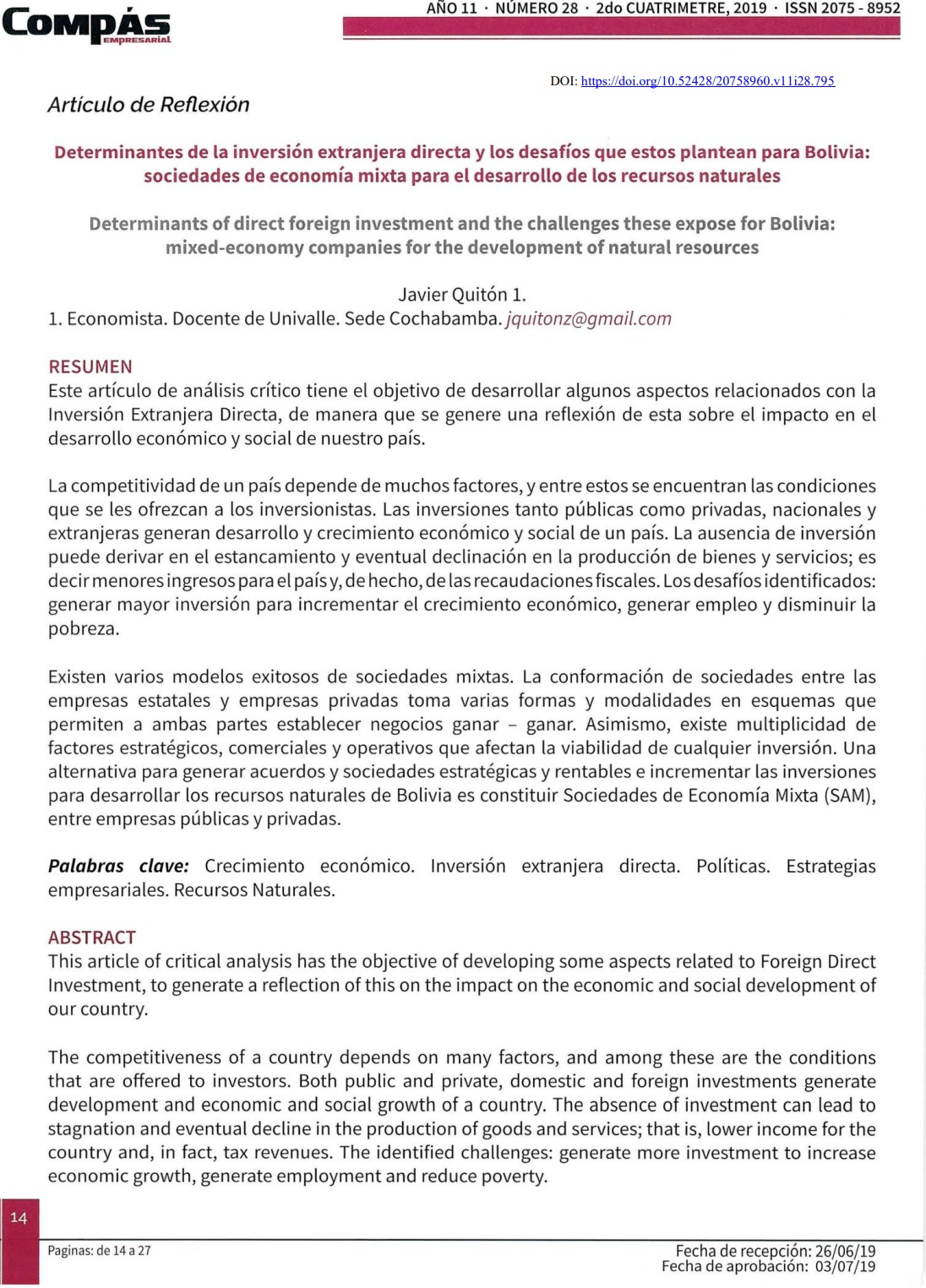Determinants of direct foreign investment and the challenges these expose for Bolivia: mixed-economy companies for the development of natural resources
DOI:
https://doi.org/10.52428/20758960.v11i28.795Keywords:
Economic growth, Foreign direct investment, Policies, Business strategies, Natural ResourcesAbstract
This article of critica! analysis has the objective of developing sorne aspects related to Foreign Direct lnvestment, to generate a reflection of this on the impact on the economic and social development of our country. The competitiveness of a country depends on many factors, and among these are the conditions that are offered to investors. Both public and private, domestic and foreign investments generate development and economic and social growth of a country. The absence of investment can lead to stagnation and eventual decline in the production of goods and services; that is, lower income for the country and, in fact, tax revenues. The identified challenges: generate more investment to increase economic growth, generate employment and reduce poverty. There are severa[ successful models of mixed companies. The formation of partnerships between state companies and prívate companies takes various forms and modalities in schemes that allow both parties to establish win-win businesses. Likewise, there is a multiplicity of strategic, commercial and operational factors that affect the viability of any investment. An alternative to generate agreements and strategic and profitable companies and increase investments to develop the natural resources of Bolivia is to establish Mixed Economy Companies (MEC), between public and prívate companies.
Downloads
References
CEPAL, (2017). La Inversión Extranjera Directa en América Latina y El Caribe, Naciones Unidas, Santiago de Chile.
COMIN, F. Y D DIAZ, (2004). La Empresa Pública en Europa, Editorial Síntesis, Madrid.
ESTADO PLURINACIONAL DE BOLIVIA, (2015) Plan de Desarrollo Económico y Social 2016 -2020, en el Marco del Desarrollo Integral para Vivir Bien.
GACETA OFICIAL DE BOLIVIA, Constitución Política del Estado, febrero de 2009.
GACETA OFICIAL DE BOLIVIA, Ley 466, de 26 de diciembre de 2013.
GACETA OFICIAL DE BOLIVIA, Ley 516, de 4 de abril de 2014.
LARRAIN, F. Y J. SACHS, (2013). Macroeconomía en la Economía Global, Tercera Edición, Pearson, Santiago de Chile.
MOMMER, B., (2003). Petróleo Global y Estado Nacional, Caracas.

Downloads
Published
How to Cite
Issue
Section
License
Copyright (c) 2019 Javier Quitón

This work is licensed under a Creative Commons Attribution 4.0 International License.
Authors who publish with this journal agree to the following terms:
- Authors retain copyright and grant the journal right of first publication with the work simultaneously licensed under a Creative Commons Attribution License 4.0 that allows others to share the work with an acknowledgement of the work's authorship and initial publication in this journal.
- Authors are able to enter into separate, additional contractual arrangements for the non-exclusive distribution of the journal's published version of the work (e.g., post it to an institutional repository or publish it in a book), with an acknowledgement of its initial publication in this journal.
- Authors are permitted and encouraged to post their work online (e.g., in institutional repositories or on their website) prior to and during the submission process, as it can lead to productive exchanges, as well as earlier and greater citation of published work.









